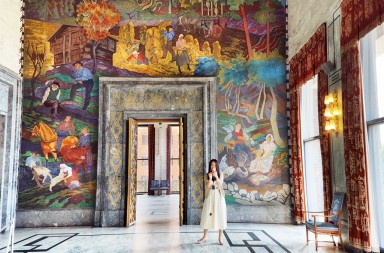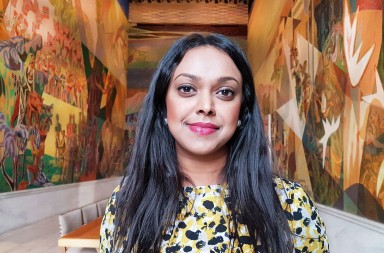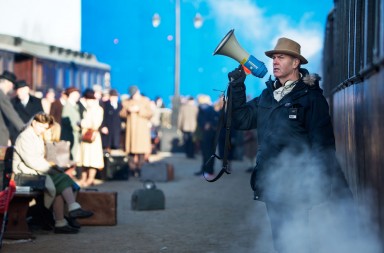Liv Tørres, Executive Director of the Nobel Peace Center in Oslo, is an active voice in Norwegian contemporary debate within topics related to international politics, the refugee crisis, and leadership. She talks about her experiences with the anti-apartheid movement in South Africa, meeting refugees, women in the workplace and the power of ordinary people to effect change.
Born in Oslo on 7 July 1961, Liv Tørres is the Executive Director at the Nobel Peace Center in Oslo. Former Secretary General of the Norwegian People’s Aid (NPA), Liv has worked for the research foundation FAFO and the Research Council of Norway. She holds a PhD in Political Science from the University of Oslo and has been a political advisor to the Minister of Labour, Hanne Bjurstrøm.
A Working Class Girl
Coming from the east side of Oslo is a large part of her identity. “I grew up with a sort of labour movement identity,” she says, “and the link to the labour movement has been the red thread through many of the things that I’ve been doing.”
Liv cites two main values that she learned from the labour movement and through her time working with trade unions: organising collectively for your rights, and striving for better equality through a more even distribution of wealth. When she gives speeches to youth, she uses schools as an example of the value of organising. If a student is unhappy about a decision made by the leadership, it is important to unite with like-minded students and then you will be heard: “If you stand together, you stand a lot stronger than on your own.”
“Collective organizing is one key idea of the labour movement, and another is of course that the gap should not be too big between what is earned at the bottom of the labour market and what is earned at the top.” She continues, “These two principals were basically very influential in shaping Norway. We have the smallest wealth gap in the world, it’s a very egalitarian society, and this is, to a large extent, due to these main ideas brought forward by organisations like the trade union movement.”
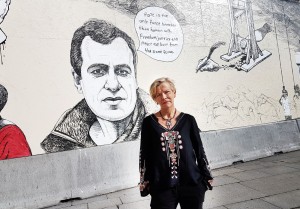
South Africa: The Trade Unions and Nelson Mandela
After majoring in Political Science at the University of Oslo, she moved to South Africa in 1987 with her husband at the time. “When I came to South Africa in 1987 I was 26 years old, I was supposed to be a diplomat’s wife there but took contact very quickly with the trade unions in South Africa and totally fell in love with this fantastic movement.” She quickly began working with the trade unions, linking up with union leaders and shop stewards in four of the large unions in the Congress of South African Trade Unions (COSATU) federation. Liv Tørres was in South Africa during a historic time for the country in the late eighties and early nineties: “It was put on the agenda to build a political strategy to topple apartheid, and the trade unions very quickly became the spearhead of the whole anti-apartheid movement.”
Liv recounts one of the first COSATU congresses she attended. She had gone to give a talk as an international guest, and there was a huge hall filled with thousands of people, shouting, singing, and applauding. “They introduced me by name, and I got up and I called ‘Amandla!’, which was a normal greeting and it means ‘power’, and then the hall would reply ‘to the people!’, which was really what they were struggling for, to get equal rights for everyone. I will never forget,” Liv says, “me calling ‘Amandla’ and the whole hall responding.”
Liv Tørres met Nelson Mandela on several occasions. “He was probably one of the smartest minds around in terms of tactical issues: when to negotiate, when is there a need for an armed strategy or to put more pressure on the regime.” Liv was particularly impressed by one of Nelson Mandela’s speeches to a COSATU congress in the early nineties. Mandela asked the people to promise that if the African National Congress (ANC) ever began to treat the people in the same way that the apartheid regime had, the people would mobilise against them. “And that’s a fairly powerful thing. I don’t think you’ve had many other leaders who’ve said, ‘if we don’t behave, you actually have to crush us. Remind us or remove us’.” As representatives of the people, the ANC should be held to account. “It’s about democracy,” Liv concludes.
Liv remained in South Africa until 1990, and since then she has moved back to South Africa on and off for long periods. “I’ve been travelling my whole grown-up life,” Liv says, “so South Africa is my other country, in so many ways.”
Living in a Fragile World
“We very seldom move abruptly from a healthy country and system to a catastrophe and war,” Liv notes. “Things start sliding. And at some stage, you don’t realise actually how many things have shifted. How much radicalisation, extremism, and tension have grown.”
“I think we all have this idea, conscious or not, that very modern, well-developed countries cannot fall apart almost. But it is incredibly quick to destroy things. And that to me is a fairly scary and big point. I don’t think people realize that. It’s very easy and quick to destroy five-lane highways and skyscrapers and it’s very, very difficult to rebuild everything afterwards.” Liv remarks that the costs to people are staggering.
Liv Tørres: “Everyone talks about that: ‘human lives are so valuable’. And I see all these sentences on paper, but I often wonder whether people really understand the costs of having had a job, a car, a house, a family, and suddenly ending up from there to a settlement in the Beqaa Valley where all you have is an old cell phone with a photo of the family you used to have.”
Liv describes a family of Syrian refugees she met in Lebanon who she thinks about often. She asked them what their life had been like in Syria before they had to flee:
“Both their faces changed, and the husband looked at me and he said ‘we lived a really happy and privileged life. We were not very rich, but we thought we were rich.’ And he said, and he kept on repeating, ‘sometimes we ask each other if we are living in a dream—well, a nightmare—or if this is real.’”
Liv Tørres has been in authoritarian countries in very high-risk settings, in transition countries, in wars, conflict settings, and at some stage, she says, she started thinking more and more about the need to focus more on peacebuilding to see how we could find ways and tools to settle conflicts.
Europe’s Migrant Crisis: “We could have done better”
Over 1 million migrants and refugees crossed into Europe in 2015, resulting in a division in the EU over how best to deal with resettling people. Many are fleeing the ongoing conflict in Syria, violence in Afghanistan and Iraq, or abuses in Eritrea. According to the International Organization for Migration (IOM), more than 3,770 migrants were reported to have died crossing the Mediterranean in 2015.
Liv Tørres: “In terms of resources, in terms of work, in terms of practical capacity, Europe had the capacity to take 1 million last year.”
“I think Angela Merkel saw that very clearly,” Liv says. Last year, Germany became the largest single recipient of first-time individual asylum claims globally. “In addition to the human factor,” Liv says, “she also knew that actually there was a shortage of labour in Germany, and the German economy was speeding and had the capacity to grow even more.”
“I think it’s important to say first and foremost that of course, we are talking about the refugees here and not everyone who enters the country. It wasn’t like all the people who arrived were refugees. The people who do not have a need for protection, I think everyone agrees, should be returned. But a lot of the people, the Eritreans, the Syrians, it was very clear that they had a need for help and a right to protection.” Furthermore, Liv points out that many of these refugees are highly educated, highlighting those from Syria and Eritrea as an example: “Before the civil war started in 2011, the last UNESCO figures for Syria for 2011 shows that 30% have got three years or more of higher education, and it’s similar for men and women, which is also quite extraordinary and a big surprise to many people.”
Liv reflects on how Norway dealt with the migrant crisis in 2015. “I think we did not deal with it well last year,” she says, “I think it took too long to get the apparatus going”. “Now I’m talking on the minus aspects. There were also some amazing people in the civil service, and among the volunteers, who did an amazing job last year.” However, she observes that it was a relatively long time before there was an integration policy on the table. “Take the Syrians,” Liv says of those that arrived last year, “no one has asked them up until now what qualifications they have.”
“NOKUT [the Norwegian Agency for Quality Assurance in Education] came out with a press release saying that they were ready to start speed confirmation of people’s qualifications,” she continues, “and they were turned down.” This has meant that many people have been left waiting, sitting in reception centres.
“No one has asked them whether they are doctors, whether they are engineers […] and no one until now is checking that as a basis for where they should actually send them, where they should live.”
She concludes, “I think we could have done better, let me put it like that.”
Refugees: Hard to Adapt in Norway?
When Liv Tørres was head of the NPA, she met people in the reception centres they were running. Many had been waiting for a decision on their applications for years. “Sometimes even speeding up the admin process is a more human way of dealing with people, even if they have to get returned,” she suggests. “What I’m seeking I guess is a balanced, responsible, adult way of treating people right now.” She clarifies that she is not referring to people working in the civil service, many of whom are working incredibly hard. “I’m following some of the Syrian refugees that I met last year very closely,” Liv says. She refers to one family that has all the formalities completed, they now know the municipality they are moving to, and they are happy. “But they’ve been moved six, seven times, you know?” This family comes from a large city in Syria.
“They’re used to skyscrapers […] and then they’re being sent to the mountains in Norway, and that’s one of the absurdities to me. We talk about a refugee crisis, and a lot of people who talk about a refugee crisis in Norway have never really seen a refugee because we sent them to all these remote little places that a lot of us have never been to.”
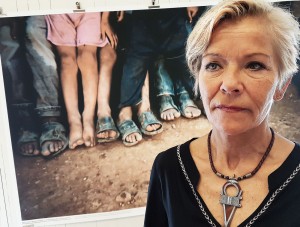
“I remember this one day when they were sent up to this closed holiday resort up in the mountains,” Liv says. “Now, it’s not like a hotel, it’s small cabins. It was freezing cold and it was so dark outside, it was black. They got sent up there in the evening, there was nobody else there, they were put into a cabin, and they freaked out, you know? Most Norwegians if they’d heard about this story would say, ‘they’re just spoilt! Here they get a cottage…’. But I can understand that very well, I would have freaked out. They had never seen a black sky like that.” Upon arrival, they phoned Liv in panic: “Some of these reactions were hard for Norwegians to understand, thinking that the refugees should be happy. And they are, but they need time to adjust.”
The Labour Market: Getting New Energy In
How is it for migrants looking for work in Norway? “We have a very open economy,” Tørres says, though, “With the recruitment practices that we have in Norway, we are not good enough to get new energy in. I think we have a labour market where we are not good enough as employers in the first place to integrate new groups, but we keep on recruiting people to management and to jobs that look exactly like the people who were there before them.”
Norway has seen the same challenges with the recruitment of women, and they introduced a 40% quota for female directors of listed companies. “I have no problems with quotas […] Some people reacted very strongly to this: ‘this is discrimination of men’. But if you look at history, how it was before, in practice it was discrimination against women.”
“My starting point is not only about a political idea of representation or integration. But it’s also because I believe that workplaces, museums, the cultural sector, public sector, private enterprises are becoming better if they recruit talent from the whole market.”
“Migration is Not New”
“Migration is not new,” Liv states. “What is crucial is how we deal with it.”
“People move around all the time,” Liv observes, “and yes, of course, we cannot take everyone, but we can take a few, and I think we could have taken more than what arrived here last year.” The vast majority of refugees are hosted by developing countries, particularly those close to the refugees’ country of origin. Turkey hosts around 2.5 million refugees from Syria, and Lebanon over a million, for example. Similarly, migrants seeking work or better living conditions tend to move to a nearby country. “Only 1 out of 10 are coming to the industrialised countries, most people travel to poorer or middle-income countries, they travel to their neighbouring countries when they are seeking a better livelihood.”
Liv Tørres: “I think the area where we are having most capacity problems are in the area of, what can I call it, ideas, values, culture.”
“The free European labour market with Swedes and Eastern Europeans coming here has had more impact on our society than the refugees. And I’m not saying that the prior is wrong, I think that is also part of being part of a global economy, but people are now making the refugees and the Muslims into the biggest problem in the world.”
On 18 September 2016, a Syrian man reported to be an asylum seeker dissatisfied with the asylum system here in Norway set fire to himself outside the Nobel Peace Center in Oslo.
“Why is it,” Liv wonders, “that someone in his twenties is getting to the point of such desperation that he puts himself on fire in Oslo? And secondly, why is it that this is not a massive media issue?”
The rhetoric around Europe’s migrant crisis has been controversial in Europe. While many people have sought to help those affected by the crisis through volunteering, donations, and protests, others have reacted to the arrival of refugees and migrants with fear and panic. Some of the language used has been dehumanising, with refugees sometimes being referred to in the media as ‘swarms’.
Liv believes that political leaders should not ramp up this negative atmosphere. “When the refugee crisis hit last year, I was very both upset and disappointed about a few of the politicians whipping up a very tense situation. Leadership is a category which requires responsibility. If you are a leader and you get afraid about a lot of people arriving in Norway, then you have to keep quiet about it basically. You are paid to be calmer, more responsible, cooler, tougher than anyone else.”
“Yes, we do have more humanitarian crises, we have an international setting which is maybe not more dangerous than a few decades back, but far more complex and therefore more unpredictable, and that is worrying a lot of people for good reasons. But the moment we start blaming individuals or groups for that, we are creating problems that are more worrying than the conflicts and the original background. And I’m worried about extremism growing in Europe, I’m worried about attitudes towards other people, groups that are now growing very rapidly.”
“People are Angry”
“Look, I am very worried about the state of affairs right now,” Liv Tørres says. In the aftermath of Brexit in the UK, and with the upcoming presidential election in the U.S., populist anger and divisions among people have become very clear.
In parallel with widespread increases in income inequality, the idea has grown that the reason many people are struggling is because of immigration. “While in actual fact,” Liv notes, “if you look at the U.S. for example, it’s very interesting to see Trump running around saying that it’s the other people’s fault, cruising on this wave of populist frustration and anger while Wall Street has become massively rich in the same period.”
Liv recounts a disturbing encounter on the train from Washington to New York earlier this year, where she was seated next to some people from the finance sector. “I had this most scary discussion,” she says, “unfortunately I’m not very good at keeping quiet if people are sitting loudly talking about Hillary and Trump next to me.” They asked Liv where she was from, and she answered. “They said ‘it’s about time we stop subsidising people like you’. And I looked at them and I said ‘are you serious? Do you really think that I’ve been living off your money, or Norway has been living off your money?’ I went off the train at my stop and I was fuming with anger,” Liv says, “and I thought if I can get this angry, how would people feel about comments like that in the Middle East or in Iraq, where Americans actually invaded?”
Liv Tørres: “I think if you go two or three decades back when people were angry about low wages, unemployment, lack of a roof over their heads etc., they would actually go to the trade union movement, have political protests in the streets. Now instead they are being told, and a lot of people believe it, that it’s somebody else’s fault.”
The Optimist
Even when challenges appear to be insurmountable, Liv believes that they can be overcome. “I’m an optimist,” Liv says, “so I always think that things are much easier than what they turn out to be.” In addition to having a positive outlook on life, she explains, “the experience in South Africa, and this was particularly those first few years, taught me also that, or confirmed, that anything was possible, you know?”
“I gave a speech in South Africa a couple of weeks back on how to reboot social dialogue to get the employers and the unions and the state to talk to each other again, and some people were saying it’s too hard. And I said to them, ‘look, it was you who taught me that anything is possible. You toppled apartheid!’”
“No one thought that would be achievable in our lifetime,” Liv says, “so I guess the conclusion is that anything is possible if you build the right strategy, including building your alliances. The labour movement taught me that.”
The Nobel Peace Center
Founded in 1901, the Nobel Peace Prize has been awarded to over 100 individuals and more than 20 organisations. Each year, the prize is given out in Oslo according to Alfred Nobel’s will: ‘to the person who shall have done the most or the best work for fraternity between nations, for the abolition or reduction of standing armies and for the holding and promotion of peace congresses’.
The Nobel Peace Center is a museum that presents the laureates and their work through exhibitions, artworks, and guided tours. The centre aims to foster reflection and engagement on issues of war, peace, and conflict resolution. Outside the centre, there is a 60-metre-long, 4-metre tall artwork depicting eight people who made huge sacrifices in their fight for freedom of speech: ‘Unknown Numbers’. “We are very happy to be able to portray some of the real heroes of freedom of speech to the 80,000 people passing Rådhusplassen every day.”
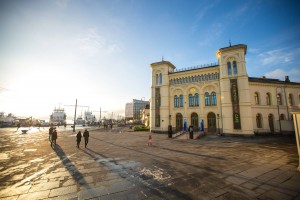
The Nobel Peace Center is situated on the City Hall Square in Oslo, on the harbour front. Photo: Johannes Granseth
Watch the announcement of the new Nobel Prize laureates at the Peace Center on 7 October, and celebrate with exclusive events on 8 October. The Nobel Peace Prize ceremony will take place on 10 December at the Oslo City Hall.
Visit the Nobel Peace Center: More information here.
Interview: Dina Johnsen & Georgina Berry / Text and entire research: Georgina Berry / Photos: Dina Johnsen
